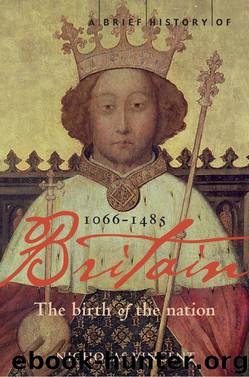A Brief History of Britain, 1066-1485 by Nicholas Vincent

Author:Nicholas Vincent [Nicholas Vincent]
Language: eng
Format: epub
ISBN: 9781849012140
Publisher: Constable & Robinson
Published: 2011-03-25T16:00:00+00:00
6
EDWARD I TO EDWARD III, 1272–1377
In the 1080s, Robert Curthose, son of William the Conqueror, had declared that he would become King of England even if he were in Alexandria when his father died. It was an empty boast. In the entire period between 1066 and 1272, only one King had followed his father on to the English throne as his father’s eldest son, and the circumstances here, with the accession in 1216 of the nine-year-old Henry III, at the height of civil war, with most of southern England under rebel or French control, were hardly an advertisement of the stability of English kingship. By contrast, in 1272, not only was Henry III’s eldest son accepted unquestioningly as England’s King but, in bizarre fulfilment of Curthose’s boast, he happened at the time to be, if not in Alexandria, then returning across the Mediterranean from crusade in the Holy Land. Edward’s very name, chosen in honour of Edward the Confessor, the last of the Anglo-Saxon kings, promised stability and a return to good order.
In the century after 1272, England was to be ruled in turn by three kings, all named Edward, each of them of very different character. The heroic, crusading Edward I is generally ranked amongst the premier league of great English kings, responsible for the conquest of Wales, for the first attempted English conquest of Scotland and for the restoration of royal authority after the chaos and confusion of his father’s reign. By contrast, Edward I’s son and heir, Edward II, ranks if not as the worst, then as perhaps the most feckless of England’s medieval rulers, utterly unsuited to his position, a sexually ambiguous wastrel, literally a layabout who had difficulty even in getting up each morning, persuaded after fifteen years of weak rule and disasters both in foreign and domestic policy into a final period of tyranny and extortion which plunged England into yet further baronial rebellion and led eventually to his deposition and murder.
Whatever qualities Edward I had possessed skipped a generation, being reborn in Edward III, albeit that the character of the new King, like that of Edward I before him, was moulded in quite deliberate determination to avoid the failings of his father. Edward III it was who built up the great war machine of England, reviving the military glories of his grandfather’s reign, setting England on course to become a state organized for war. As the son of the King of England and of a daughter of the King of France, Edward III inherited a claim to the French throne, leading after 1337 to the outbreak of the Hundred Years War, that great slogging match in which the national and political identities of both countries were reforged. It is already symptomatic of the emergence of English identity, that, even in 1340, when Edward III came to devise a new style for himself, as King of both nations, he chose to place England above France in the list of his titles: ‘Edward King of
Download
This site does not store any files on its server. We only index and link to content provided by other sites. Please contact the content providers to delete copyright contents if any and email us, we'll remove relevant links or contents immediately.
| Africa | Americas |
| Arctic & Antarctica | Asia |
| Australia & Oceania | Europe |
| Middle East | Russia |
| United States | World |
| Ancient Civilizations | Military |
| Historical Study & Educational Resources |
Life of Elizabeth I by Alison Weir(1576)
The Invisible Wall by Harry Bernstein(1461)
Art of Betrayal by Gordon Corera(1133)
The Decline and Fall of the British Empire, 1781-1997 by Piers Brendon(930)
A Brief History of Britain, 1066-1485 by Nicholas Vincent(929)
1916 in 1966 by Mary E. Daly(902)
A Brief History of Britain, 1485-1660 by Ronald Hutton(894)
Mary, Queen of Scots by Weir Alison(857)
Thunderstruck by Erik Larson(854)
Guy Burgess by Stewart Purvis(826)
The Last Lion 02 - Winston Churchill - Alone, 1932-1940 by William Manchester(786)
The Last Plantagenet by Thomas B Costain(721)
Coalition by David Laws(711)
London: A Biography by Peter Ackroyd(699)
1066 by Andrew Bridgeford(699)
Henry VIII by Alison Weir(694)
Gimson's Kings and Queens by Andrew Gimson(636)
Diana by Andrew Morton(613)
The Boleyn Women by Elizabeth Norton(593)
